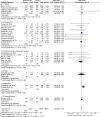Anti-inflammatory interventions for the treatment and prevention of depression among older adults: a systematic review and meta-analysis
- PMID: 40169548
- PMCID: PMC11961752
- DOI: 10.1038/s41398-025-03317-3
Anti-inflammatory interventions for the treatment and prevention of depression among older adults: a systematic review and meta-analysis
Abstract
Recent evidence from clinical and animal studies with anti-inflammatory agents in depression is conflicting. One possible reason is the heterogeneity of baseline inflammation levels. Since older adults are generally associated with chronic low-grade inflammation and depression is one of the most common mental disorders in this population, this meta-analysis aimed to evaluate the therapeutic and preventative effects of anti-inflammatory interventions for depression among older adults. PubMed, Cochrane Library, Embase, and PsycINFO were searched for randomized controlled trials (RCTs) up to November 18, 2024. The primary outcomes were mean change scores of depression scores and incidences of depression after treatment. Pooled standard mean differences (SMDs) and odds ratios (ORs) including 95% confidence intervals (95% CI) were calculated. Of 3116 screened articles, 31 RCTs met the inclusion criteria, with 25 studies investigating efficacy and 7 studies investigating the incidence following anti-inflammatory treatment. Anti-inflammatory interventions were statistically significantly more effective than placebo in reducing depressive scores for older adults with depression (SMD = -0.57, 95% CI = -0.98 to -0.15, p = 0.008). Sub-group analyses supported the use of omega-3 fatty acids (SMD = -0.14, 95% CI = -0.27 to -0.02, p = 0.03) and botanical drug or dietary intervention (SMD = -0.86, 95% CI = -1.58 to -0.13, p = 0.02) among older participants. While limited by substantial heterogeneity among included studies, these results reveal the moderate beneficial effects of anti-inflammatory interventions for the treatment and prevention of depression among older adults. Future high-quality RCTs are warranted to determine which anti-inflammatory interventions are most preferential for older patients with depression.
© 2025. The Author(s).
Conflict of interest statement
Competing interests: The authors declare no competing interests.
Figures






References
-
- Blazer DG. Depression in late life: review and commentary. J Gerontol A Biol Sci Med Sci. 2003;58:249–65. 10.1093/gerona/58.3.m249 - PubMed
-
- Tang T, Jiang J, Tang X. Prevalence of depressive symptoms among older adults in mainland China: a systematic review and meta-analysis. J Affect Disord. 2021;293:379–90. 10.1016/j.jad.2021.06.050 - PubMed
-
- Kok RM, Reynolds CF 3rd. Management of depression in older adults: a review. JAMA. 2017;317:2114–22. 10.1001/jama.2017.5706 - PubMed
-
- Alexopoulos GS. Depression in the elderly. Lancet. 2005;365:1961–70. 10.1016/s0140-6736(05)66665-2 - PubMed
Publication types
MeSH terms
Substances
Grants and funding
LinkOut - more resources
Full Text Sources
Medical
Miscellaneous

